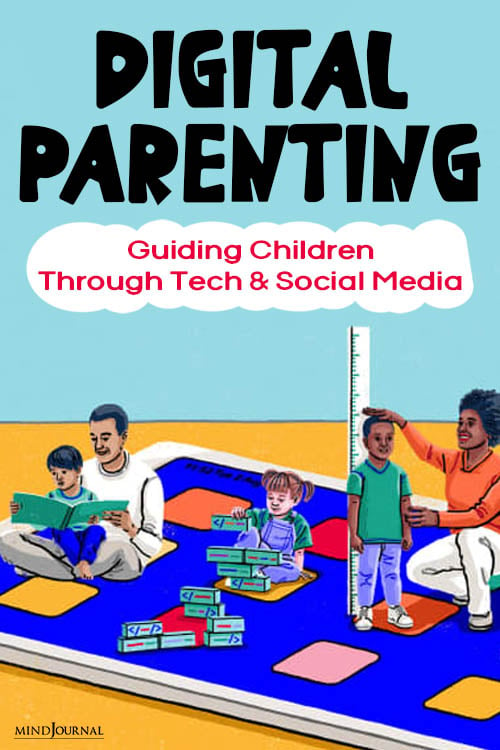How can digital parenting help balance technology and social media in a child’s life? Let’s learn the best ways to ensure online safety and healthy digital habits!
Here’s how parents can navigate the challenges of technology and social media.
Key points
- Parents play a critical role in helping their children use technology responsibly.
- Begin teaching a child self-restraint regarding technology use and social media involvement early.
- Help a child develop alternative interests that engage their attention and compete with technology’s pull.
- Calculate the amount of time spent engaging with tech and social media, weighing its costs and benefits.

Read More Here: Navigating Unavoidable Girl Drama
One thing we know is that technology and social media have changed the world and changed parenting. But both technology and social media have brought blessings and curses. The blessings include the educational content, opportunities for self-paced learning, and connection for the disconnected. For example, some kids live in more rural areas where same-age peers live far away.
There are also urban city kids who live in neighborhoods where it’s dangerous to get together at a playground. And there are still other kids who feel marginalized and more isolated by their small numbers or by aspects of their identities (e.g., LGBTQ).
The curses include the risk of harm that is possible because of children’s ability to venture virtually anywhere with limited or no supervision and social media influences that lead vulnerable adolescents to question their self-worth and engage in unhealthy social comparisons.
The two stories below illustrate some of the most frequently encountered challenges that span the age range of users, along with suggested responses.
A couple of months ago, I was at the airport sitting near a mom and her young daughter, who I’m guessing was about five or six years old. The little girl was playing with an iPad when her mother said that she would have to stop because the battery was going to be too run-down, and they would be boarding their plane soon.
The girl was compliant but, after about a minute or so, complained that she was bored. Her mother acknowledged that she may be bored.
The young girl said that she didn’t like being bored, to which her mother replied that she could understand not liking the feeling of boredom. She added that we can all feel that way from time to time, but we have to adjust to these less pleasant feelings. She also added that her daughter could choose to entertain herself so as to combat her boredom.
I loved this mom’s response. She had affirmed her daughter’s feelings, indicating that boredom is one that we all experience. Although it may not be the pleasantest of feelings, boredom is something we can tolerate, and we can respond to and alter it by taking personal action.
Digital Parenting
Here are some takeaways that address issues raised directly and indirectly in the story:
Cultivate alternative activities from a young age.
Don’t wait until your child is a teen to tell them to develop some other activities to pass the time. You want your child to be used to entertaining themselves. For many of us, we use tech because it’s easier than doing anything else. It’s the kids who can’t entertain themselves who are most vulnerable to engaging in risky behaviors in their teen years.
Be a model of alternative activities.
Have your child see you pursue and engage in other activities (e.g., reading a book, listening to music, being physically active). Have them see you interact with others in real-time, not just virtually, through texts or social media platforms like Instagram and Facebook.
Help foster your child’s social skills.
This is especially important if you believe they gravitate towards social media because it is an easier way of interacting with others or because they have some social anxiety.
Don’t wait until your child is a teen to restrict or take away tech or set limits on social media usage.
Introduce the notion from the get-go. In part, you are training your child to be able to disengage from tech —not always an easy task. And you are not removing tech to be punitive. You are saying there are some things we can’t do all the time, like TV.
Comment on how you avoid certain sites because they call your self-worth into question.
Explain that they may lead you to doubt yourself and create unrealistic standards you might try to attain. In my previous post, I mentioned how children between the ages of about 10 and 14 can be particularly vulnerable to social media messaging.
Model self-restraint and boundaries.
Put away your phone at certain times —not texting or looking at it at the dinner table, or maybe not doing so unless you have an important call or message you are waiting for and need to respond to. And just as important, you are stating this so they know the relative importance of the reason for your distraction.
Engage in self-talk.
Let your child hear you reason out why you put your phone in a remote location at night so that you are not tempted to look at it.
And here’s one more story that illustrates a few more points worth keeping in mind.
A few years ago, I was in the market for a new TV. I hadn’t purchased one in years, so I decided to go to Best Buy and have a salesperson sell me on all the options I could consider. The interesting strategy used by the salesperson was to tell me how much time I was spending watching TV.
He thought this was going to help make his case for why it would be worth spending more money on certain additional features. Instead, it depressed me, and I vowed to limit my TV watching so that I could better allocate my time to tasks that I believed would have more tangible payoffs.
The calculated time spent watching TV during NFL season alone easily reached 300 hours—and that was only based on Sunday games. What I could do with 300 hours of effort on anything!
Help your child realize how much time they are spending on tech.
This is likely to be especially helpful with your older children, certainly those in middle school and beyond. Depending on their age, figure with them or ask them to figure out exactly how much time they spend in a day, week, month, and even during an entire school year on distracting activity—in this case, tech and social media.
You are doing this for the same reasons the salesman did it. I hadn’t realized the total time spent and possibly squandered on non-essential TV watching.
For parents whose children doubt their ability in academic domains, ask what effect their efforts would have if they spent more time practicing the particular skill.
Over the years, I have heard too many students question their competency because they see a peer succeeding. They imagine that their peer’s success is without effort, that their peer is gifted, and they are not.
What they often fail to realize is that the peer has put a substantial amount of time and effort into reaching their current level of accomplishment.
For students who are engaging with tech multiple hours per day, which isn’t unusual, it’s easy to see how a student’s performance can be compromised by the amount of time they are not spending on a school-related task.
Certainly, there are other considerations regarding your child’s tech usage and time spent on social media, but these are some suggestions that will get you started in significant ways.
Read More Here: Does Gentle Parenting Work?
Do you manage your child’s social media usage? Tell us your thoughts on digital parenting in the comments below!
Written by Pamela D. Brown Ph.D.
Originally appeared on: Psychology Today










Leave a Reply